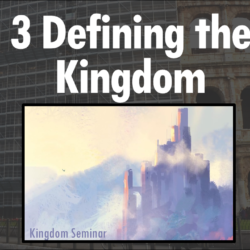Today we’ll tackle the biggest question of all: who is God? We’ll take a journey through scripture together to discover what God is like, stopping at key moments to consider what this or that interaction tells us about him.
—— Notes ——
theology: one’s understanding of God
Ontology vs. Functionality
- ontology: understanding something based on what it is (it’s essence)
- tendency to define God based on what he is (omnipresent, omnipotent, omniscient, omnibenevolent)
- perfect being theology: reasons from perfection to generate characteristics that God must have independent from what he reveals about himself in the bible
- bible tends to define God based on what he’s done and his relationship w/ people
Creator desiring trusting relationships
- creation
- Adam and Eve
Limited participant in human affairs
- in time, with us, not aloof (we’ll get to predestination later)
- Cain and Able
- warns Cain
- does not force him or prevent him
- Lamech
Heartbroken exception maker
- Nephilim
- Gen 6
- Noah’s flood
Preemptive preventer
- Babel
the God of Abraham, Isaac, & Jacob
- the call (Gen 12.1-4)
- Yahweh is going to be Abraham’s God
- he’ll have his back
- bless those who bless
- curse those who curse
- he’s just looking for someone to believe him, to trust him, to do what he says
- three tests of trust
- leave your land
- circumcise yourself and all your men
- the Akedah (binding of Isaac)
- with Abraham and Sarah we find the opposite of Adam and Eve
- believed God’s promises
- left their native land to be with God in promised land
- trusted God to perform the impossible
- over time grew more faithful
- died trusting God
- by the end of all of this, God irreversibly yoke’s himself to this family through covenants
- covenant faithfulness and chesed
- henceforth, God’s dealings w/ Abraham affect how he PRIMARILY refers to himself
- I am the God of Abraham, Isaac, and Jacob
Powerful liberator and god-mocker
- burning bush
- how does God introduce himself to Moses?
- the God of Abraham, Isaac, and Jacob
- the name
- Pharaoh’s question (Ex 5.1)
- 10 plagues as God telling Egypt and the world who he is vis-à-vis the Egyptian gods
- he is the God above all other gods
- Passover meal memorializes the historical event of God liberating Israel
- this is how God intends to imprint faith on each generation (festivals)
Exclusive moralist
- ten commandments begin w/ several statements of exclusivity
- singular pronouns!
- whenever anyone ever uses a pronoun for God in the bible it is singular: he, him, his, you (sg.)
- basic moral code
8 attributes of God
- Exodus 34.6-7
6 The LORD passed before him and proclaimed, “The LORD, the LORD, a God merciful and gracious, slow to anger, and abounding in steadfast love and faithfulness, 7 keeping steadfast love for thousands, forgiving iniquity and transgression and sin, but who will by no means clear the guilty, visiting the iniquity of the fathers on the children and the children’s children, to the third and the fourth generation.”
chesed (חֶסֶד)
- John Goldingay: “It is sometimes described as covenant love, though in the OT it rarely appears in the company of the word “covenant.” It is used in two connections: when someone makes an act of commitment for which there is no reason in terms of prior relationship, and when someone keeps their commitment when they might be expected to abandon it (e.g., because the other person has done so). It is the Hebrew equivalent to the Greek agape.”[1]
- Translators struggle to express chesed in English (ESV = “steadfast love”, NASB = “lovingkindness”). However, chesed is at the core of God’s character. It occurs 255 times in the Old Testament in the following distribution:
- John Oswalt: “No single English word can encompass all the connotations of this Hebrew word, but its basic idea is of passionate loyalty, especially of a superior to an inferior. In its basic usage, it refers to the obligations of covenant, but in the biblical experience of God, it comes to express that loyalty which goes far beyond any legal obligation in a passionate concern for the well-being of the other. It is this that God has for his people, which expresses itself in ‘grace,’ ‘mercy,’ ‘unfailing love,’ ‘kindness,’ and several other similar English words.”[2]
- gracious covenant loyalty
Law giver
- Law = constitution
- social laws
- health laws
- food laws
- worship laws
- tabernacle
- priestly requirements
- sacrifices
- purity
- feasts (celebrate seasons)
- civil laws (esp. wrt. king)
- yom kippur: way to deal with national sin
- fidelity laws (Deut 4.35, 39; 6.4-5)
- what does the Law tell you about God?
- he really like justice
- he wants his people to be desocialized from surrounding nations to prevent syncretism
- he wants his people to be an example to the world (Ex 19.5-6)
- somehow the people reflects the God
God of the prophets
- prophets are often people uniquely touched by God
- visions of God (Isaiah 6; Daniel 7; Ezekiel 1; etc.)
- whoring after other gods (Ezek 16)
- Isaiah 40s
- predatory economic practices
- ancestral entitlements combined with capitalism and a reset button
- predict God’s coming judgment and restoration
- call for repentance in light of the coming “Day of the LORD”
Wrathful punisher
- captivity of northern Israel
- threefold conquering of Judah
- exile
- end of 2 Kings/2 Chronicles
refuses to abandon people while they suffer his consequences
- worked w/ prophets through exile
- Jeremiah, Ezekiel, Daniel
- Lam 3.19-32 (chesed, once again)
- Mordecai, Esther
- faithful to his promise to bring people back after 70 years
- Joshua, Zerubbabel, Ezra, Nehemiah
Father
- how does Jesus talk about God?
- same as other Jews
- Mark 12.28-34
- Jesus constantly calls God father
- Lord’s prayer (Mat 6.8-10) tells us to call God Father as well
- this happens a little in the OT, but nothing like with Jesus
At work in Jesus of Nazareth
- John 1.14 catena indicating Jesus’ transparency
- Jn 5.19, 30; 8.28; 12.49-50; 14.10, 28
- his words, his deeds, his will
- Jesus reveals who God is by always doing his will
lover through atonement
- cross as supreme act of God’s love
- in popular music the cross demonstrates Christ’s love
- in the bible, the cross demonstrates God’s love
- John 3.16; Romans 5.8; 1 John 4.9-10;
The restorer and kingdom bringer
- ultimately the God who sets everything right who heals all brokenness wipes away every tear and restores creation to holy fellowship
———————————————-
[1] John Goldingay, Psalms: Psalms 90-150, vol. 3, Baker Commentary on the Old Testament Wisdom and Psalms (Grand Rapids, MI: Baker Academic, 2008), page 753.
[2] John N. Oswalt, The Book of Isaiah: Chapters 40-66 (Grand Rapids: Eerdmans 1998), p. 420.
—— Links——
- See other episodes in this Theology Class
- Find more Restitutio classes here
- Intro music: Jazzy Frenchy by bensound.com. Licensed under Creative Commons: By Attribution 3.0 License.






